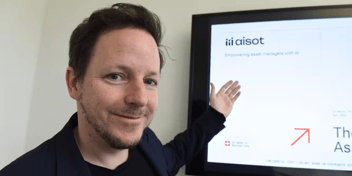Wealthtech in times of Chatbots: From ChatGPT to PortfolioGPT?
Despite the fact that almost all wealth advisors believe that AI is fundamentally changing the industry, wealth management is lagging behind other industries in its use of AI. However, the underlying technology of ChatGPT (Chat Generative Pre-trained Transformer) has the potential to radically transform wealth management.

We currently see two major developments that work in favor of an accelerated implementation of AI in wealth management. On the one hand, today’s markets, from equities to cryptos, are heavily impacted by volatility, rooted in high levels of inflation and aggravated by central banks trying to slow down price increases. On the other hand, the largest generational wealth transfer in history is under way, as baby boomers are set to pass to their children more than $68 trillion. Financial advisors already now face substantially higher demand for engagement due to high volatility levels. Considering a lack of talent in the industry, we potentially have the right ingredients in place to set the stage for a profound transformation of the industry by placing AI at the core of the wealth industry.
Will chatbots serve as AI accelerators in wealth management?
Technologies based on large language models such as OpenAI’s chatbot ChatGPT make a huge leap visible in natural language processing (NLP) by placing conversations rather than keywords at the center of business. Considering that functions across many industry verticals involve generating text and engaging in conversations, large language models bear the potential to substantially increase efficiency. While there is certainly a high degree of hype around chatbots these days, the recent developments around NLP still constitute a major milestone in technology. This technological advancement comes at the right time for a wealth management industry that is set to adopt AI and related technologies at a high pace in the years to come.
Applied to the wealth management industry, GPT technologies in combination with Machine Learning (ML) applications have the potential to become some kind of real-time financial advisor. Just like how you have a unique set of values and principles that are constantly impacted and challenged by real-world events, chatbots combined with predictive AI applications will manage portfolios in “conversation” with the client and in the context of real-time events. With trillions of dollars on the verge of transfer between generations, the demand for sophisticated technological solutions in wealth management will sooner or later skyrocket.
Why you cannot ask ChatGPT to optimize your portfolio
But we’re not quite there yet. ChatGPT and related platforms are still at their infancy and come with a variety of limitations, particularly when trying to integrate them into the wealth management industry. Some of the issues are of technical nature while others are related to user experience. The key limitation of ChatGPT is that it cannot access the internet. This means that it it’s unable to provide real-time information about current events or recent developments. Moreover, location based information can not be used or references to anything on the internet. ChatGPT’s most recent set of data is from September 2021. Since then and now, the world has changed. Markets have changed. Programming languages have been updated. Libraries have new features. Etc. Meaning, that ChatGPT is operating on outdated data. Moreover, ChatGPT is purely textual and can not read images, urls, audio, or any other mode of input. Also its output is limited to text and code. Another limitation of chatbots is that they are unable to understand or interpret the meaning of words and phrases in the same way humans do. They simply generate text based on patterns that they have been trained on, making nuanced responses to more complicated and contextual questions almost impossible. Overall, ChatGPT and other language models can be very useful for a variety of tasks, but currently have some limitations and should not be relied upon for the type of decisions required in wealth management. However, these limitations are most likely only of limited duration. When combined with other powerful AI and ML technologies, language models can help the wealth management industry to embrace new AI technologies that provide clear answers to major challenges of the industry.
Taking all current limitations of ChatGPT into account, the aisot R&D team is working on bringing the best modeling practices from Large Language Models to the portfolio optimization world for wealth and asset management clients. Stay tuned.
Further reading suggestion: “What Is ChatGPT Doing … and Why Does It Work?” by Stephen Wolfram.


